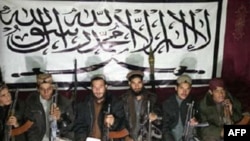Pakistan’s direct peace talks with an outlawed alliance of insurgent groups, being mediated and hosted by Afghanistan’s Taliban rulers, have reportedly made progress, with both sides agreeing to pause the process for internal deliberations and return to the negotiating table by mid-June.
The several days of discussions between Pakistani security officials and commanders of the Tehrik-i-Taliban Pakistan (TTP), or the Pakistani Taliban, concluded over the weekend in the Afghan capital, Kabul, with both sides pressing their set of demands and promising to adhere to an ongoing temporary cease-fire to preserve the progress, officials and militant sources said Monday.
The meeting marked the second round of talks between the two rivals since early this month when they first came to the negotiating table at the request of the Afghan Taliban, a Pakistani official told VOA on condition of anonymity because he was not authorized to talk with the news media.
The peace process has led to the temporary cease-fire, release of dozens of militants from Pakistani jails and a significant reduction in TTP attacks in Pakistan.
The nearly month-long truce was due to expire Monday but would likely be extended to help prevent derailment of the fragile process, the Pakistani official said. He noted that even if there were no formal militant announcement about an extension in the cease-fire, there would be no “major” counter-militancy operations” by Pakistani security forces, nor would the TTP carry out attacks against them.
“The situation [around the talks] has been very hopeful so far,” the Pakistani official said. “Both sides have decided to pause the process to review the progress they have achieved and seek clarity from their respective leaderships on how to move forward,” he said.
The Pakistani official hailed the host Taliban government for making “utmost efforts” to ensure relevant TTP commanders were present at the table to productively carry the dialogue forward. He noted that acting Afghan Interior Minister Sirajuddin Haqqani “is playing the key role” in mediating the talks.
The official said Haqqani was “personally available in some sessions” of the just concluded talks and “effectively intervened to remove deadlocks or impediments” to help push the process.
While Pakistani officials have not yet formally commented on the peace process, the Afghan Taliban publicly confirmed on May 18 at the end of the two-day inaugural meeting that Kabul hosted it and acted as intermediary. Taliban spokesman Zabihullah Mujahid said at the time his government “in good faith to promote peace, strives for the negotiating process to succeed and expects both sides to be tolerant and flexible.”
Islamabad is asking TTP negotiators to terminate their insurgency against Pakistan and dissolve the group in favor of a peaceful resettlement to their native country, according to sources close to the process.
For their part, TTP negotiators have been consistently insisting that Pakistan restore the traditional semi-autonomous status of several of its northwestern districts bordering Afghanistan, formerly known as the Federally Administered Tribal Areas, or FATA.
The militants also demand both the removal of Pakistani troops from the rugged mountainous region and implementation of their brand of Islamic justice system in erstwhile FATA, citing their rejection of the Pakistani constitution as un-Islamic.
Speaking to VOA, senior Pakistani security officials Monday again rejected these demands as unacceptable.
For decades, FATA had served as a haven for local and foreign militant outfits, including al-Qaida and the Afghan Taliban. Pakistani troops in recent years carried out major ground and air offensives, dismantling the terror infrastructure and forcing thousands of TTP militants to flee to the Afghan side of the border.
The Afghan Taliban and their al-Qaida partners used the Pakistani tribal region for regrouping and directing cross-border attacks against U.S.-led international troops in Afghanistan. TTP had sheltered, facilitated and provided them with recruits.
TTP-led suicide bombings and other terrorist attacks have killed tens of thousands of Pakistanis, including security forces, since its inception in 2007. Sustained Pakistani security operations significantly degraded TTP abilities to conduct extremist actions.
The group has intensified attacks on Pakistani forces from Afghan bases since the return of the Taliban to power in the neighboring country, killing scores of Pakistani security forces and prompting Islamabad to reportedly conduct cross-border airstrikes against TTP hideouts.
A new United Nations report earlier in May also noted the role Haqqani is playing in facilitating Pakistan’s talks with the TTP, although it cautioned that prospects of success of the peace process were bleak.
“Haqqani mediations have not led to a sustainable cease-fire but are a further indication of Mr. Sirajuddin’s central role within the Taliban as a mediator and figure of authority among rank-and-file of TTP and other mainly Pashtun groups in eastern Afghanistan,” said the U.N. annual report of the 1988 Taliban sanctions committee monitoring team.
U.S. officials have long maintained that Haqqani runs his own group of militants independent of the Taliban, known as the Haqqani Network. His areas of influence or operation have been or are largely the eastern and southeastern Afghan border provinces, where TTP has set up its sanctuaries after fleeing Pakistani security operations.
Haqqani allegedly is also closely aligned with al-Qaida. Washington has offered $10 million for information that will lead to his arrest.
The Taliban took over Afghanistan last August, days before the U.S.-led foreign troops withdrew from the country after nearly 20 years of war with the-then insurgent group. The Islamist rulers have assured neighboring countries and the world at large that they would combat terrorism on Afghan soil to prevent it from becoming a haven for transnational groups.
The U.N. report, however, suggested that TTP has gained from the Taliban’s return to power in Kabul. It has around 4,000 fighters in Afghan areas bordering Pakistan, making up the largest group of foreign fighters based there.





